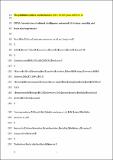Coevolution of cultural intelligence, extended life history, sociality, and brain size in primates
Abstract
Explanations for primate brain expansion and the evolution of human cognition and culture remain contentious despite extensive research. While multiple comparative analyses have investigated variation in brain size across primate species, very few have addressed why primates vary in how much they use social learning. Here, we evaluate the hypothesis that the enhanced reliance on socially transmitted behavior observed in some primates has coevolved with enlarged brains, complex sociality, and extended lifespans. Using recently developed phylogenetic comparative methods we show that, across primate species, a measure of social learning proclivity increases with absolute and relative brain volume, longevity (specifically reproductive lifespan), and social group size, correcting for research effort. We also confirm relationships of absolute and relative brain volume with longevity (both juvenile period and reproductive lifespan) and social group size, although longevity is generally the stronger predictor. Relationships between social learning, brain volume, and longevity remain when controlling for maternal investment and are therefore not simply explained as a by-product of the generally slower life history expected for larger brained species. Our findings suggest that both brain expansion and high reliance on culturally transmitted behavior coevolved with sociality and extended lifespan in primates. This coevolution is consistent with the hypothesis that the evolution of large brains, sociality, and long lifespans has promoted reliance on culture, with reliance on culture in turn driving further increases in brain volume, cognitive abilities, and lifespans in some primate lineages.
Citation
Street , S E , Navarrete , A F , Reader , S M & Laland , K N 2017 , ' Coevolution of cultural intelligence, extended life history, sociality, and brain size in primates ' , Proceedings of the National Academy of Sciences of the United States of America , vol. 114 , no. 30 , pp. 7908-7914 . https://doi.org/10.1073/pnas.1620734114
Publication
Proceedings of the National Academy of Sciences of the United States of America
Status
Peer reviewed
ISSN
0027-8424Type
Journal article
Description
Funding: European Research Council Advanced Grant “Evoculture” 232823 (K.N.L.), John Templeton Foundation Grant 23807 (K.N.L. and S.M.R.)Collections
Items in the St Andrews Research Repository are protected by copyright, with all rights reserved, unless otherwise indicated.

